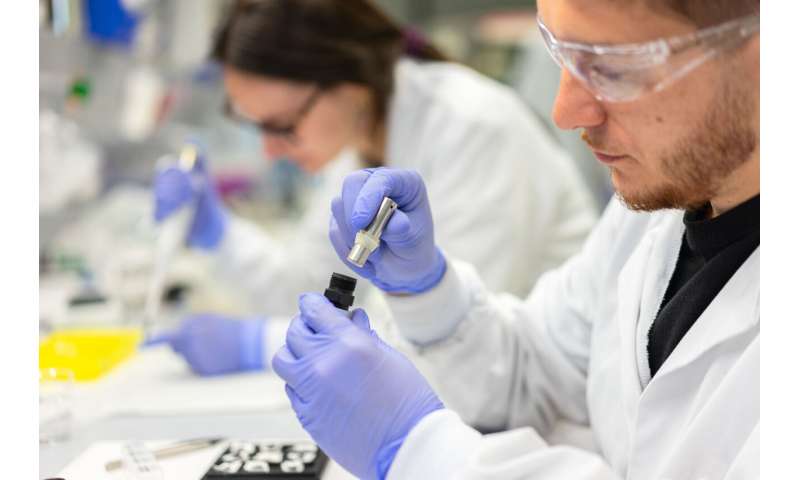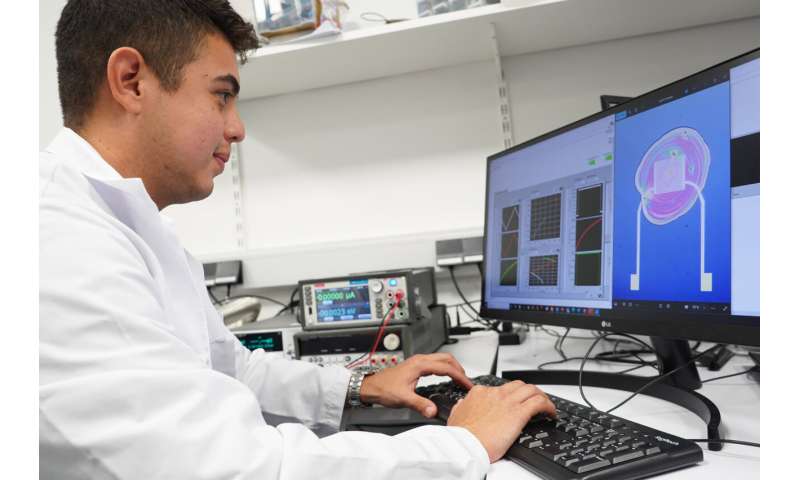Researchers have managed to modify a class of proteins to give them the ability to transport and store electricity. These proteins can be used to create sustainable, efficient and biocompatible conducting materials. These materials are highly stable and easy to process, which means they can be incorporated into industrial processes.
The study, led by Aitziber L. Cortajarena (Ikerbasque Research Professor and scientific director of CIC biomaGUNE), Reyes Calvo (Ikerbasque Research Professor at BCMaterials) and Maica Morant (senior researcher at CIC EnergiGUNE), has been published in Advanced Materials, and comes within the framework of the e-PROT project.
The proteins used in this work were designed in the lab. They are made up of small, repeated units that are assembled one by one like LEGO bricks. Each “brick” has the same overall shape, and when fitted one after the other, a larger, ordered, stable and modular structure is built. This structure makes them more usable, as they can be provided with specific functions without altering their structure, which renders them tailor-made.
In this case, the team of researchers were seeking to get the protein to conduct electricity efficiently. To achieve this, they genetically modified the DNA, which contains the instructions for producing the protein.
-

Conductive proteins are integrated into an energy storage device. Credit: CIC energiGUNE
-

Juan David Cortés, a Pre-PhD researcher at BCMaterials recruited by the eProt project, exploring the conductivity of films formed by modified proteins. Credit: BCMaterials
The future of energy storage devices
The changes made to the protein facilitated the movement of ions within the material, and thanks to this ionic conduction property, the proteins were successfully incorporated into an efficient energy storage device capable of storing and releasing energy very quickly.
Going forward, these conducting, protein-based materials could replace the traditional conducting materials used in batteries and supercapacitor devices, which would make them much safer for the human body. Conductive proteins are of particular interest for the development of bioelectronic devices, such as pacemakers, implantable glucose sensors, and brain electrodes used to treat diseases such as Parkinson’s.
The results of this study are opening the door to the next generation of energy storage devices based on sustainable, safe and inherently biocompatible materials.
In fact, it is no longer difficult to imagine a future in which energy can be stored sustainably. A world in which phones, fitness trackers and other portable devices run on energy stored in biodegradable, sustainable and safe materials. Scientific research is closer than ever to making this vision a reality.
More information:
Juan David Cortés‐Ossa et al, Engineered Protein‐Based Ionic Conductors for Sustainable Energy Storage Applications, Advanced Materials (2025). DOI: 10.1002/adma.202508838
Citation:
Artificial proteins offer new path for fast, sustainable and biocompatible energy storage devices (2025, November 5)
retrieved 5 November 2025
from https://techxplore.com/news/2025-11-artificial-proteins-path-fast-sustainable.html
This document is subject to copyright. Apart from any fair dealing for the purpose of private study or research, no
part may be reproduced without the written permission. The content is provided for information purposes only.

